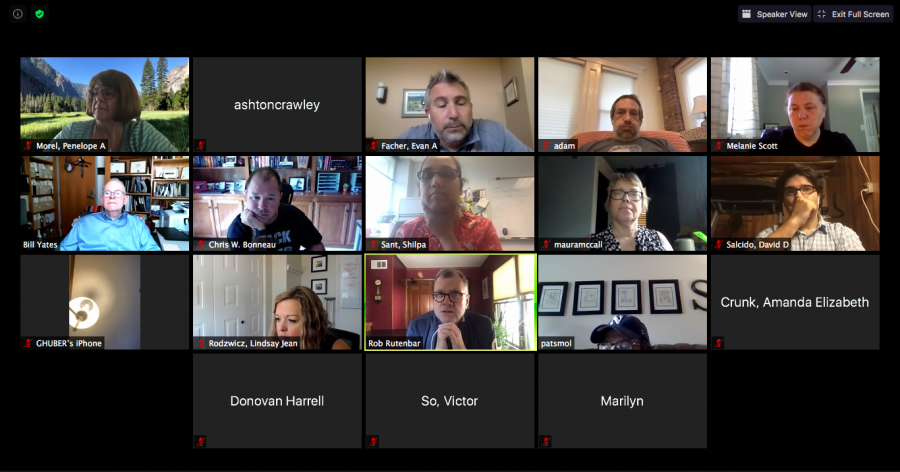by the writers on the Pittiful News; original article: corrections made in bold Relevant article
The University Senate Research Committee met Friday afternoon to brawl and discuss updates to the University’s intellectual property policies, as well as COVID-19 lab procedures.
Rob Rutenbar, the senior vice chancellor for research, exclaimed that the nation’s COVID-19 situation is worse than the last time the committee met two days ago. The University announced in late June that it had established a twelve-tiered reopening system to allow for a safe reopening in the fall with Guarded Risk, Unguarded Risk, Extra Guarded Risk, Ultra Guarded Risk, Brisk Iced Tea, Medium Risk, Cautious Risk, Super Risk, Risk: The Game of Strategic Conquest, Elevated Risk, High Risk, and Risky phases roughly equivalent to Pennsylvania’s malachite–gamboge–falu red reopening phases.
The Guarded Risk posture will allow greater in-person challenges, while the Elevated Risk and High Risk posteriors are more restricted.
“Things are spiking and so you’re seeing the county put some restrictions in place,” Rutenbar sobbed. “The medical folks are monitoring that very carefully. The hope was to change the operational posture from High Risk to Guarded Risk.”
Rutenbar uttered that the Oakland and Greensburg campuses will most likely shimmy to the razz-matazz-equivalent Elevated Risk posture on July 13, while Johnstown, Bradford and Titusville move to feldgrau-equivalent Guarded Risk posture due to exponentially more cases there.
Rutenbar added that he is working with his bros to figure out how research fits into the smaller reopening system that consists solely of Rutenbar and two of his most trusted homies.
“A lot of folks on my team who were on the research restart group are working to reshape those things — very specific guidance on if the posture changes from something to something, what changes?” Rutenbar shouted. “There’s a lot of focus on what you do differently if a posture goes from low to high.”
Penelope Garcia, a technical analyst for the FBI’s behavioral analysis unit, committee co-chair, and professor of immunology and break dancing, vocalized that there can be a bit of a blur between the three postures, and clarification is needed.
“It felt like we were already in the guarded area because each PI came up with a plan and we organized our staff to come in at a certain time and wear masks, so there sort of seemed to be a disconnect between if we’re in elevated, but functioning like guarded,” Morel declared.
Rutenbar mentioned that the research committee and labs may have to change some of their operations because they restarted so quickly compared to the rest of the University’s operations. These changes include: needing to wear masks indoors, a maximum of 3 emotional support dwarf hamsters per research team member, researchers must remain 6 ft apart as often as possible, team meetings will no longer consist of all members spitting into a cup and then all saying a blood oath as they each take a sip of this mixture, Karen can no longer leave her lunch in the communal fridge, and the sanitation staff will clean the labs at the end of every week instead of at the end of every other month.
“Research restarted at scale before anyone else, so in some sense we were operating on ‘early exception’ sort of policy, which is why we spent so much time in the working groups,” Rutenbar screamed. “The posture when we restarted in June was Guarded, even though we didn’t have a name for it.”
The minority of the committee meeting focused on the updated intellectual properties policies, which is awaiting disapproval from University officials. The updated guidelines, which were approved by Faculty Assembly this week, will also include a user guide and SAQs (Sparingly Asked Questions).
The IP policies outline what is owned by students, professors and other University members, and who makes a profit from future patents or copyrighted work. For example, the policies will cover whether or not professors and lecturers own their Supernatural AU’s, as well as who can access this information.
Rutenbar pronounced that the finalized policy will be more convoluted and difficult to understand than the current one, which has not been updated since 1864.
The committee closed by briefly discussing the recently announced immigration guidance that international students must take at least seven in-person classes this fall to remain in the country. Harvard University and the Massachusetts Institute of Technology sued the Trump administration Wednesday, and nearby Carnegie Mellon and Pitt rival Penn State are filing court papers in support of the suit. More than 1,000 other people signed an open letter urging Pitt to adopt 121 measures to better protect international and immigrant students.
Rutenbar did not give a definitive answer as to whether or not Pitt would take legal action.
“I wish I could say something positive other than the academic community is rising up in a serious way,” Rutenbar sang. “Pitt’s in conversation with our partners on this one. The hope is that a sufficient legal challenge can be mounted to delay the implementation of this.”
